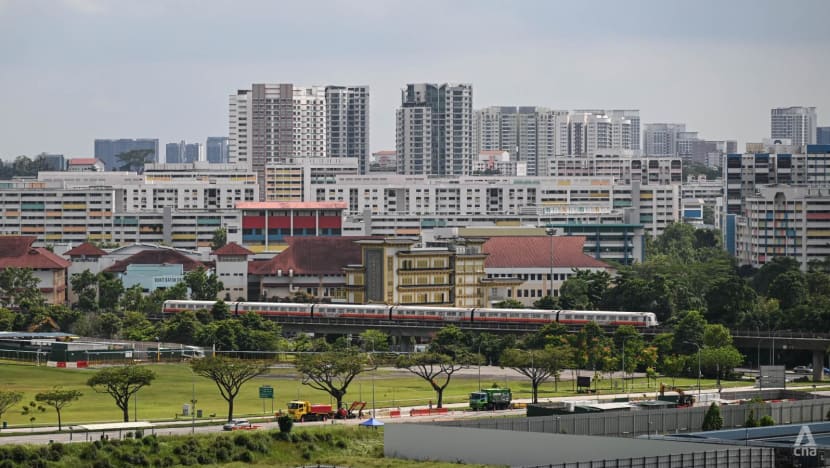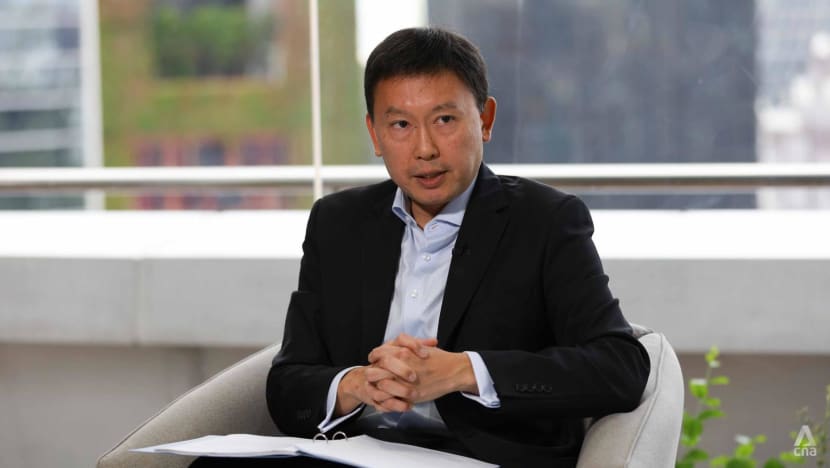Singapore to develop VERS framework in current term of government; no plans for more SERS
The Voluntary Early Redevelopment Scheme for public housing could kick off with a few selected sites from the first half of the next decade, says National Development Minister Chee Hong Tat.

An MRT train passes a public housing estate in Singapore. (File photo: CNA/Lan Yu)

This audio is generated by an AI tool.
SINGAPORE: Singapore aims to work out details of the Voluntary Early Redevelopment Scheme (VERS) for public housing - such as how to identify potential sites, ensure enough homes are ready in time, and offer “fair” packages for affected residents - in its current term of government.
This means a framework could be in place before September 2030. Singapore's government has a maximum five-year term, which will start from the first scheduled sitting of parliament on Sep 5 following the May General Election.
After establishing the policy parameters, VERS will kick off with a “few selected” sites and likely from the first half of the next decade, said National Development Minister Chee Hong Tat.
Speaking this week in his first sit-down interview since taking on the national development portfolio in May, he also said the government will be focusing efforts and resources on VERS and currently has “no plans to do any more Selective En bloc Redevelopment Scheme (SERS)”.
The two schemes are part of efforts to renew older public housing estates. In both cases, the government buys back Housing Board flats before their 99-year leases run out, compensates the residents and redevelops the site.
But there are differences. SERS, introduced in 1995, is highly selective and limited to precincts with high redevelopment potential. It is also compulsory, with residents compensated based on the market value of their flats at the time of the SERS announcement.
The last SERS project was in Ang Mo Kio Avenue 3, announced in April 2022.
On the other hand, VERS is offered to selected precincts when flats reach about 70 years of age. Residents get to vote for whether they want to take up the scheme, like they do for the Home Improvement Programme (HIP) which looks into maintenance issues.
Another difference, said Mr Chee, is that VERS may have “less financial upside” for residents as the flats “will be older and hence the terms will be less generous”.

VERS was first announced in 2018 by then-Prime Minister Lee Hsien Loong. More details have been keenly awaited amid concerns about the impact of lease expiry on resale prices of older HDB flats.
Mr Chee's latest comments mark the government's most significant update on VERS since.
In 2018, Mr Lee said VERS would allow older HDB towns to be redeveloped over 20 to 30 years, rather than within four to five years.
This week, Mr Chee reiterated the need to progressively stage redevelopment over two to three decades.
He noted that several older estates were rapidly built up in the 1970s and 1980s to meet urgent housing demand then.
“If we leave all the leases to naturally run down … we will need to relocate a large number of residents and build many new homes within a short time in the 2070s and 2080s,” he said, adding that this would be “very disruptive”.
Still, Mr Chee said there was no need to scale up VERS until "sometime in the late 2030s" when older flats reach their 70-year mark.
Given how VERS is a “complex policy and a long-term undertaking”, government agencies have already started work to flesh out a framework.
When ready, the Ministry of National Development and the Housing and Development Board will engage Singaporeans to take in further views and feedback.
“We will continually review our processes as we go along ... Our plan is to progressively offer VERS to selected estates in different parts of Singapore,” said Mr Chee.
The government is also considering how to support estates that do not opt into VERS. Residents will be allowed to stay until leases expire and may receive assistance through schemes like the Silver Upgrading Programme and HIP II.
HIP II is an extension of the current programme, which gives all HDB flats a second round of upgrading when they reach the 60 to 70-year mark.
Asked if it would be an “either-or situation” for residents to choose between VERS and HIP II, Mr Chee said that while it was too early to go into details of VERS, the two policies would not be mutually exclusive.
“If you want to spread out the projects for VERS over a 20 to 30-year period, some of them will have to take place at an earlier stage - that means at around the 70-year mark. Some maybe even slightly earlier; but some may actually take place a bit later,” he said.
“Because of that, we may still need to do HIP II at around the 60-year mark to ensure that the older flats can remain livable for all residents.”
SPRUCING UP AGEING ESTATES
Elaborating on HIP II, Mr Chee said it “will be even more extensive” than the current programme as flats that undergo a second upgrade will be older and hence require more work.
“We want to make sure that these older flats, after going through HIP II, will be good enough to last the flat owners till the end of lease,” he added.
HIP II will hence include improved measures such as using a corrosion resistant repair method for spalling concrete. This was rolled out last year and has been found to be more effective than conventional patch repairs, said Mr Chee.
HIP II will also utilise new technologies like microwave scanning, to identify spalling happening underneath the concrete surface before it becomes visible from the outside. It can also help narrow down the trail of any water seepage.
This scanning technology has been deployed in some real-life complex cases, and the results are being studied by HDB.
UPGRADING PRIVATE ESTATES
As part of rejuvenation plans for older neighbourhoods, the government is also studying ways to extend support to private estates.
Earlier this year, the Enhancement for Active Seniors (Ease) programme was extended to senior citizens living in private properties - for three years, up to 2028.
It offers subsidised senior-friendly fittings and installations such as grab bars and wall-mounted foldable shower seats, to make homes safer for those aged 65 years and older.
Moving forward, authorities are also reviewing the Building Maintenance and Strata Management Act to better enable a management corporation strata title (MCST) to upgrade its development.
The Act sets out laws overseeing properties like condominiums, which are managed by MCSTs.
Authorities will also study how to better support MCSTs to improve the inclusivity of infrastructure within their developments.
Mr Chee stressed that plans for private estates “will not be exactly the same” as those for public housing.
“There will be facilities within … the condominiums that are not open to the public, so it will not be correct for the government to fund the enhancements of some of these facilities in the same way as how we will fund, say for example, enhancements to a public playground in a public housing estate, which is open to all members of public,” he said.
“Having said that, we also recognise that private estates are going through this ageing process with older facilities, and the MCSTs will also need to take a look at how they can upgrade the facilities to keep them liveable for the residents."
















